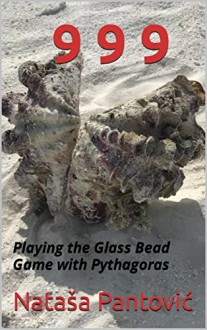999 Playing the Glass Bead Game with Pythagoras is A-Ma: Alchemy of Love & Tree of Life: a Journey into Field of Dreams combined! "Seated on a panel with her fellow writers, Maltese-Serbian novelist Nataša Pantović has been known to use slam poetry to perform her poetic body of work. A bridge...
show more
999 Playing the Glass Bead Game with Pythagoras is A-Ma: Alchemy of Love & Tree of Life: a Journey into Field of Dreams combined!
"Seated on a panel with her fellow writers, Maltese-Serbian novelist Nataša Pantović has been known to use slam poetry to perform her poetic body of work. A bridge builder between East and West, following ancient archaeological findings, she often dives into historic settings more than 2,000 years back in time.
In her novel, Ama, the 52-year-old author makes a bold swerve into less-travelled territory. She chooses for her protagonists Ama, an African priestess, living in China’s Macao in the 17th century; Ruben, a Portuguese Jesuit priest; and Fr Benedict, an Orthodox Christian.
The book explores the rapidly-growing Macao, of the Age of Enlightenment.
Both Hesse and Tolstoy were my first spiritual gurus. Through their deep insights and soulful messages, for the first time I experienced the world of spiritual growth and deep contemplation. Many artists have inspired my writings, the likes of Leonardo da Vinci, Lao Tzu and Giordano Bruno. Pythagoras lived on the crossroads of civilisations, as I see us, and he has given us his fascinating research into music and numbers. With my deep respect towards ancient worlds, Pythagoras with his ancient Egyptian mystical knowledge had to be my protagonist.
In your novel, you follow the famous reform of the Chinese calendar during the 17th century?
I started writing this as a 17th-century novel. In this novel, it was easy to write from the point of view of the main character, a priest or Ama’s mother or a man without a name or a goddess, Lilith.
I wanted to bring in the many first-person singular voices, starting with an animal ‒ a bat, as a story-teller, moving to Pythagoras, to people who meet Ama within the setting of her coffee house. This narrative framework is 50 % inspired by the ‘=yin’ mindset; and 50%t factual, male and mind-driven.
What is it within this black main character that fascinates you so much?
Ama lived with me for 10 years before I knew I would adopt two kids from Ethiopia,
Was Athens black at the time of the ancient Greeks or was it full of Slavs that during the Dark Ages were not allowed to have their own European history?
All my characters do have strong political, ideological and moral commitments, their ideas are ground-breaking; it is a science against the Church, male against female, East against West conversation.
Holding up a mirror to society of ancient worlds can be fanatical or too obvious within the storytelling environment, so I had to break the rhythm with myths, with art, with dreams.
This novel is, of course, about the search for truth, but from the goddess perspective, about love and union, of the priestesses first commandment “Do not kill...”
In this novel you explore ‘Western’ ancient Greek philosophers. Can you talk about your use of the Eastern concept of ‘mindfulness?
There are a number of ‘instant happiness’ gurus out there, I do not believe in a ‘get rich in a day’ message, but I do believe that if we learn how to listen to our soul, we will be able to live our highest potential.
We live in a rapidly changing world. When I was born in Belgrade in 1968, at the time of no TV or internet, the population on the planet was three billion. Now they say it is seven billion.
The changes I have seen during my lifetime are huge. Emotionally, mentally and physically, we have to adopt different behaviour patterns, not just to survive, but to thrive without abusing other social groups or animals or endangering planet Earth.
The next stage, the stage of cultural life, is beyond the knowledge of more than 90 % of the population.
Having a % of population that neither collects objects nor watches TV, nor reads newspapers, that is still capable of thinking, un-hypnotised, to appreciate art, or dance or sing, iis a part of my research fascination."
show less

